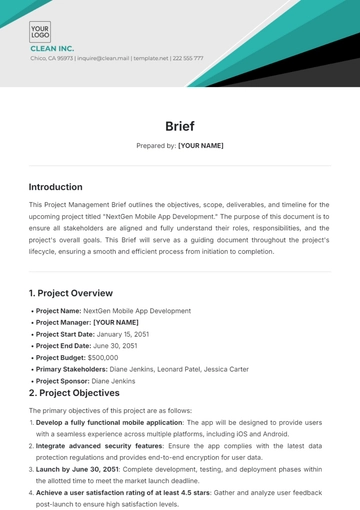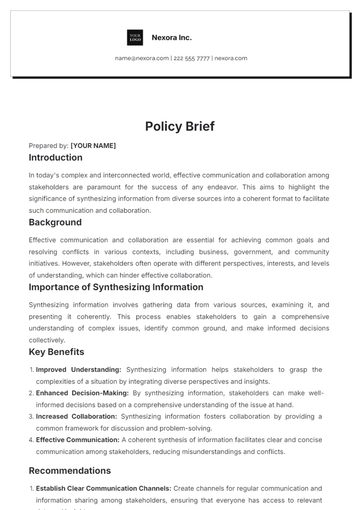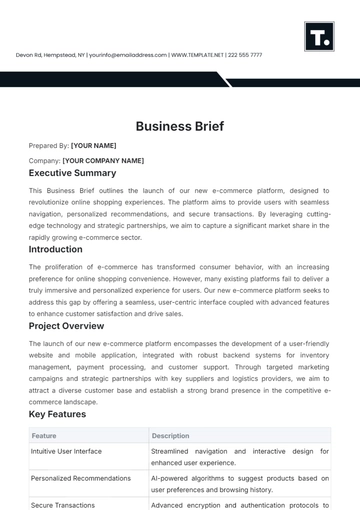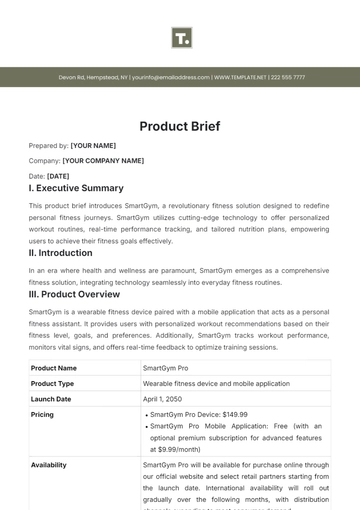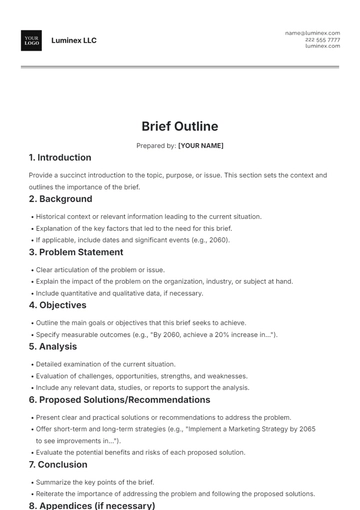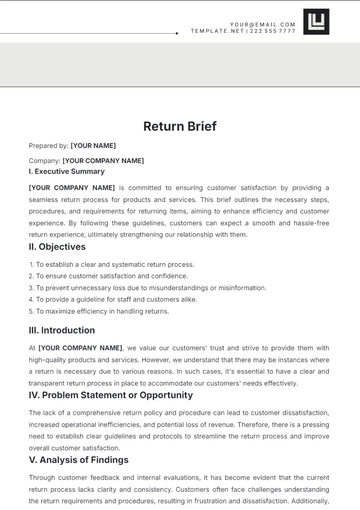Free Tech Training Brief
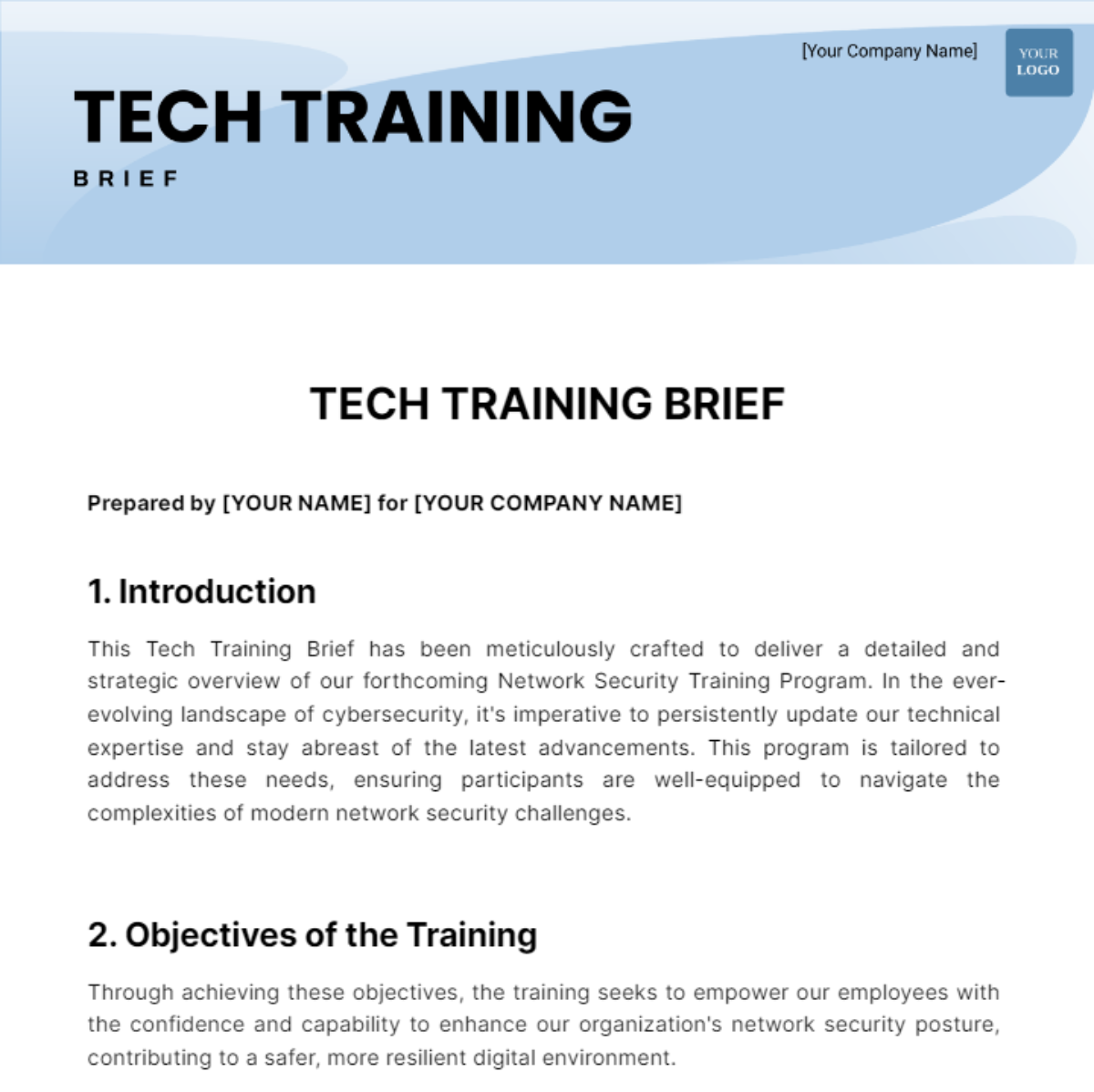
Prepared by [YOUR NAME] for [YOUR COMPANY NAME]
1. Introduction
This Tech Training Brief has been meticulously crafted to deliver a detailed and strategic overview of our forthcoming Network Security Training Program. In the ever-evolving landscape of cybersecurity, it's imperative to persistently update our technical expertise and stay abreast of the latest advancements. This program is tailored to address these needs, ensuring participants are well-equipped to navigate the complexities of modern network security challenges.
2. Objectives of the Training
Through achieving these objectives, the training seeks to empower our employees with the confidence and capability to enhance our organization's network security posture, contributing to a safer, more resilient digital environment.
Elevate the technical proficiency of our team members in the domain of network security, ensuring they possess a robust skill set that meets the current industry standards.
Introduce and master cutting-edge network security techniques, enabling our workforce to leverage the most advanced tools and methodologies to safeguard our digital assets.
Foster a comprehensive understanding of potential cybersecurity threats, alongside effective strategies for their identification, prevention, and mitigation, thereby cultivating a proactive security mindset.
Seamlessly integrate security practices within everyday operational functions, emphasizing the importance of security in all aspects of our technological engagement.
Equip participants with the knowledge and tools necessary to tackle real-world network security challenges head-on, preparing them to anticipate, respond, and adapt to the dynamic cybersecurity landscape effectively.
3. Content of the Training
This structured approach to the training content is aimed at providing a comprehensive, in-depth learning experience, ensuring participants emerge well-equipped to tackle the challenges of network security.
Module | Content Description |
|---|---|
Module 1 Essential Network Security Concepts and Principles | This module lays the foundation by covering the core concepts and principles of network security. Participants will explore the key components of network security architectures, policies, and procedures critical for safeguarding information systems. |
Module 2 Threat Modeling and Risk Assessment in Network Security | Participants will learn to identify, analyze, and prioritize potential threats through effective threat modeling techniques. This module emphasizes the importance of comprehensive risk assessments in the development of a robust network security strategy. |
Module 3 Introduction to Cryptographic Methods | This module introduces the basics of cryptographic methods, including encryption, hashing, and digital signatures. Participants will gain insights into how these methods are applied to ensure data confidentiality, integrity, and authentication. |
Module 4 Hands-on Session on Network Security Tools and Techniques | A practical, hands-on session where participants will engage with current network security tools and techniques. This module is designed to provide experiential learning through the use of simulations and real-world scenarios. |
Module 5: Case Studies, Best Practices, and Q&A Session | Concluding the program, this module focuses on the application of learned concepts through case studies and best practices in network security. A comprehensive Q&A session will address any remaining questions, ensuring participants have a clear understanding of all topics covered. |
4. Structure of the Training
Our Network Security Training Program is meticulously organized into five distinct modules, with each one focusing on a crucial aspect of network security. Spanning over five days, the program dedicates an entire day to delving deeply into each module, ensuring a thorough and immersive learning experience.
The daily structure is carefully designed to balance theoretical knowledge with practical application:
Morning Sessions
Participants will engage with theoretical insights, gaining a foundational understanding of the day's focus area. This will include interactive lectures, discussions, and multimedia presentations to cater to diverse learning styles.
Afternoon Sessions
The focus shifts to hands-on practical exercises, where participants will apply the morning's learning to real-world scenarios using state-of-the-art network security tools and techniques. These sessions are structured to foster critical thinking and problem-solving skills essential for network security professionals.
End-of-Day Wrap-Up
Each day concludes with a session dedicated to case studies and best practices, encouraging participants to reflect on the day's learning. This segment aims to contextualize the knowledge gained, illustrating its application in addressing contemporary network security challenges.
Interactive Q&A Sessions
Ample opportunities for questions and discussions are provided throughout the program. These sessions are integral to ensuring clarity and deepening understanding, allowing participants to explore topics of interest in greater detail with the guidance of our expert trainers.
5. Intended Outcomes
The principal goal of this Network Security Training Program is to fortify our team with advanced knowledge and practical skills in the field of network security. Beyond the mere transfer of technical know-how, the program is meticulously designed to cultivate a comprehensive security mindset among participants. Key intended outcomes include:
Enhanced Knowledge Base: Participants will emerge with a deeper understanding of network security principles, tools, and techniques. This encompasses a broad spectrum from foundational concepts to the latest advancements in the field.
Practical Skill Development: Through hands-on sessions and real-world simulations, attendees will gain the ability to apply their knowledge in practical settings, enhancing their proficiency in using network security tools and methodologies effectively.
Proactive Security Mindset: The training is tailored to instill awareness and alertness toward potential security threats. Participants will learn to think one step ahead of cyber adversaries, adopting a proactive approach to identify, prevent, and mitigate risks.
Problem-Solving Capabilities: Empowered with the latest insights and practices, participants will be better equipped to tackle complex network security challenges, making informed decisions to protect organizational assets.
Collaborative Security Culture: By participating in this program, team members will contribute to fostering a culture of security within the organization, where knowledge sharing and collective vigilance become second nature.
6. Conclusion
This training program is set to be a cornerstone in the development of a more skilled, aware, and secure network environment within our organization. It represents a critical step forward in enhancing our stature as a provider committed to security excellence. [Your Company Name] eagerly anticipates your active engagement and is dedicated to supporting each participant through this enriching journey.
- 100% Customizable, free editor
- Access 1 Million+ Templates, photo’s & graphics
- Download or share as a template
- Click and replace photos, graphics, text, backgrounds
- Resize, crop, AI write & more
- Access advanced editor
Empower your team with Template.net's Tech Training Brief Template. This editable, customizable template, accessible in our AI Editor Tool, is designed to facilitate comprehensive technology training programs. It covers various aspects of tech training, ensuring your team stays abreast of the latest technologies and methodologies, thus driving innovation and competitive advantage.









